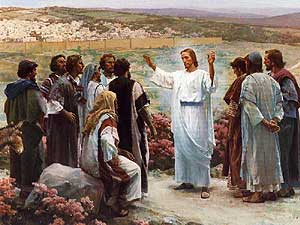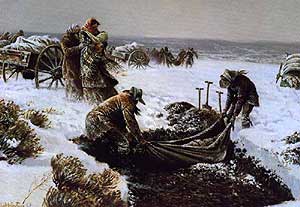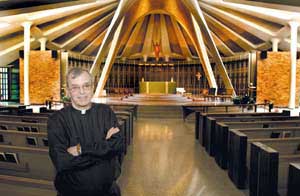AIDS, Leprosy, and Disease: The Christian Response
This article was published in Sunstone 12:3 (May 1988), pp. 6-7. At the time Ron was a volunteer for several AIDS relief projects and visited hospitalized Mormons with AIDS. Ron died of AIDS complications in 1991. © Sunstone magazine. Posted with permission.
Until recently, death, to my generation, has been quick, unannounced and accidental. We have been unaccustomed to painful, lingering deaths. We have been spared the epidemics of previous generations.
AIDS changed all that. Now young men, women, and children fight for life against a cureless plague. Death from AIDS is slow and painful. Lives are stretched thin, savings consumed, and taking another breath or living one more day is a major achievement.
The pain and suffering of persons with AIDS have caused a lot of theological discussion. Some claim that God sent this new plague to punish sinful homosexuals. Persons with AIDS have been referred to as “today’s lepers.” A look at the scriptures about leprosy and lepers helps us understand whether God sent this and/or other diseases to punish sinners and how Christians ought to respond.
Throughout the Old Testament, there are eleven references to lepers and leprosy; the New Testament has eight and the Book of Mormon only one. In the Old Testament, five instances involve the Lord or a prophet punishing someone with leprosy or using it as a sign (e.g., making Moses’ hand leprous and then healing it), Five of the references are either guidelines for priests in identifying leprosy, prescribed rites and sacrifices for cleansing those who had been defiled, or directions about separating the defiled from Israel. Perhaps the best known Old Testament reference to leprosy is the cure of the honored Naaman by Elisha who sent him to wash in the Jordan River seven times.
Yet, three specific Old Testament references describe leprosy as punishment from God: Miriam was smitten with leprosy for speaking against Moses, Uzziah was smitten for burning incense in the temple, and the Lord smote Jeroboam, King of Israel because the people sacrificed and burnt incense on the high places. Some may explain the scriptural blaming of God for the disease simply as interpretation by the chronicler of the Bible accounts; in any event, the majority of Old Testament references give instructions for dealing with the disease.

When sending out the Twelve, Jesus told them to heal the sick and cleanse the lepers, raise the dead and cast out devils, saying, “freely ye have received, freely give” (Matthew 10:8).
The New Testament references are all examples of ministering to the afflicted. There are three synoptic accounts of a single event where Jesus healed the leper, and the well-known account of the healing of the ten lepers. In Matthew, Jesus responded to the messengers sent by the imprisoned John the Baptist by enumerating his own miracles, including cleansing lepers. When sending out the Twelve, Jesus told them to heal the sick and cleanse the lepers, raise the dead and cast out devils, saying, “freely ye have received, freely give” (Matthew 10:8).
Two other references are allusions to Old Testament healings. Finally, there is the account of Jesus eating at the home of Simon the leper (who James Talmage assumes was healed) on His last Sabbath on earth. Thus, every single New Testament reference concerning lepers and leprosy deals with healing and cleansing, not punishing.
In the Book of Mormon, the only mention of lepers is during Christ’s visit when he asks to see the lame, blind, halt, maimed and leprous so that he might heal them.
Building on these scriptures to develop a Christian approach to individuals with AIDS, perhaps the most important question we could ask would be the one the disciples asked about the man born blind, “Who did sin?” “Jesus answered, Neither hath this man sinned, nor his parents: but that the works of God should be made manifest in him” (John 9:1-3). If we were to look at all disease and human suffering as an opportunity for us to show our individual commitment to Christ’s teachings–to heal and cleanse–our response to disease might be very different. True charity, or the love of Christ, is expressed in service to others. Perhaps charity is so prized of the Lord, as the Apostle Paul taught, because it is human nature to shun suffering and disease. It was this tendency that caused lepers to be ostracized and placed in leper colonies. Judaic law had a complex set of rules and rituals to separate the unclean, and to assure their cure before readmitting them to the community. It is probably safe to assume that the fear of contamination divided families, forced some sufferers underground, and caused lepers to take their own lives.

The diseases of the early Saints were numerous. Surely no one would suggest that some wickedness caused the early settlers of Nauvoo, including the Prophet’s family, to be stricken with malaria or caused the deaths of so many Saints while crossing the plains to Utah.
Loss of life was common among the early Mormons. This historical perspective on disease and suffering should help guide our response. The diseases of the early Saints were numerous. Surely no one would suggest that some wickedness caused the early settlers of Nauvoo, including the Prophet’s family, to be stricken with malaria or caused the deaths of so many Saints while crossing the plains to Utah.
My great-grandparents were among those early settlers. Their eight children died in a diphtheria epidemic. I remember going as a young child to their cemetery on Memorial Day. There, in the Kershaw plot outside St. Anthony, Idaho, I would see those small headstones all in a row, each bearing the family name and birth and death dates. The dates told a terrible tale. Grandpa Joseph Hyrum Watkins Kershaw and Grandma Julia Ann Clift lost all eight children within twelve days.
We would picture Grandpa repeatedly driving out to the cemetery, all alone, in the dead of winter 1897 to bury each child, ranging in age from seventeen to two. Within twelve days, a house full of the love and noise of eight children was emptied. Grandma was so broken hearted that Grandpa took her to Salt Lake to be with her family. When they returned in the spring they found their home had been burned to the ground by the neighbors, to keep the disease from spreading. No one would suggest their wickedness merited this great loss.
The irrational fear that motivated the neighbors to burn my great grandparents’ home is similar to the fear many feel about AIDS. It has been called a plague – God’s punishment on homosexuals. People laugh and joke about the disease and see justice and divine retribution when gay people with AIDS die such horrible deaths. Is this a Christian response?
When we consider the way that Christians should respond to AIDS, we must consider whether that response should be affected by how the disease is transmitted. For many, the overriding negative issue with AIDS is that it is a sexually transmitted disease, unlike leprosy or diphtheria. This makes it difficult for many persons to become concerned and involved. Because of society’s negative view of homosexuality, few want to become publicly involved with issues affecting homosexuals.
As a Mormon, I have been proud of the Church’s response to tragedy. We are taught to be prepared for almost any calamity. These teachings aren’t based on the assumption that God is waiting to punish us but, rather, that inevitably there will be a time of need. When illness, accident, or death strikes a member of the Church, no time is spent pondering or imagining the sins committed to bring down God’s wrath, as was done by Job’s so-called friends. We simply accept all as part and parcel of this time on earth and respond as though it were a test of our preparedness and love. King Benjamin prohibits saying “the man has brought upon himself his misery ” as an excuse to avoid helping (Mosiah 4:17).
It saddens me to see the response of my church to this epidemic. We have not been in the forefront. The institutional stance on homosexual behavior seems to have gotten in the way of Christian service. A different example is the Catholic church. Although the pope has publicly denounced homosexuality, Catholic parishes and dioceses respond to AIDS victims without hesitation.

The Reverend Paul Desrosiers, head of the New Orleans Council of Priests, explains: “I don’t believe we asked people who were dying in the streets what their religion or sexual orientation was during the yellow fever and cholera epidemic. Our tradition is to help people, and that’s what we’re doing today.”
The Reverend Paul Desrosiers, head of the New Orleans Council of Priests, explains: “I don’t believe we asked people who were dying in the streets what their religion or sexual orientation was during the yellow fever and cholera epidemic. Our tradition is to help people, and that’s what we’re doing today.” In New Orleans, all AIDS funds are administered through the Associated Catholic Charities. The AIDS hospice is managed by the archdiocese and home health care workers are dispatched from Hotel Dieu, the local Catholic hospital. Archbishop Hannon donated church property for an AIDS hospice and is searching for a site for a second facility. He said, “I don’t see any contradictions. I believe the church should be involved in the most difficult issues of society, and AIDS certainly is the most difficult issue facing us today. If there are people who are sick or hungry, the church wants to help.”
In San Francisco, Holy Redeemer Parish donated their unused convent for an AIDS hospice. Then, with the community, they raised money to renovate it. They continue to assist with the operating costs. Home visits, hospital visits, fund raising, hugging and loving are all approved activities for Catholics trying to help others deal with AIDS.
To believe that God sent AIDS, but not cancer, diabetes, high blood pressure, or sickle cell anemia is to identify only a few groups of people in our society and say that God wants to destroy them. (This belief also ignores the fact that lesbians are not among the groups at risk.)
I am greatly alarmed at the response of some members of the Church. Just as personal bigotry against blacks was found within the Church, and justified by Church dogma before blacks received the priesthood, so we find individuals justifying their bigotry towards homosexuals and persons with AIDS because of the Church’s policy on homosexuality.
Some readers may remember the embarrassing publicity over the excommunication of Clair Harward, an LDS member who was dying of AIDS. Clair wanted to reconcile himself with the Church before he died, and his bishop excommunicated him. His excommunication did not surprise me; I think anyone who has done something the Church sees as wrong and who wants reconciliation would also probably expect excommunication. What made me weep was the bishop’s instruction that Clair must leave his loving companion and all his other unacceptable friends if he wanted forgiveness. The bishop also counseled him not to attend church, out of fear of infecting others. The man did not say, “Give up your former associates and come be with us. We’ll support you.” He told Clair to give up all of the support he had, to cut off all who loved him, and die alone – while members of his ward were protected from dealing with him. I think the Lord expects better of all of us.
Unfortunately, this kind of response is not uncommon. In 1986 an LDS member in Reno, Nevada, organized a number of fellow Mormons to picket a Gay Pride Celebration sponsored by the local chapter of Parents and Friends of Lesbians and Gays. These members jeered those attending the celebration and held signs which read: “Go back into the closet; ” “AIDS is God’s punishment;” and “Goodbye Social Security – Hello AIDS.” I was puzzled by the hatred and fear these persons felt for individuals they did not know. It reminded me of the mobs in Kirtland, Jackson County, and Nauvoo when the early Latter-day Saints were the lepers of Christian society. Mormons were once labeled perverts and sinners for our sexual beliefs and practices. Polygamists were viewed by the rest of the country as “dirty old men” marrying young girls half their age. Fear and hate prevent charity, often in the name of God and justice.
Sometimes we assume that the scriptures say something they do not and then make false judgments. I agree that “wickedness never was happiness” (Alma 41:10) but I do not agree with the oft believed reverse implication that righteousness is always happiness. Alma was not talking about this life, but about the resurrection. I have had enough experience to know that God gives no guarantees for this life. He does not always reward the righteous and punish the sinful during this life. Many times the most sinful appear to be getting the best out of life, and the righteous suffer. Our success in this life depends on many factors besides our own effort, and what one would consider a “blessing” is a cursing to another.

When Alma baptized at the waters of Mormon, his test of membership was to be “wilting to bear one another’s burdens, that they may be light; … willing to mourn with those that mourn …. and comfort those that stand in need of comfort, and to stand as witnesses of God at all times in all things, and in all places that ye may be in, even until death” (Mosiah 18:8-10).
Sometimes we assume that all church membership means is to attend meetings and the temple, hold family home evening and do the other things Mormons do. What it should mean is being part of the family of God. When Alma baptized at the waters of Mormon, his test of membership was to be “wilting to bear one another’s burdens, that they may be light; … willing to mourn with those that mourn …. and comfort those that stand in need of comfort, and to stand as witnesses of God at all times in all things, and in all places that ye may be in, even until death” (Mosiah 18:8-10).
Today, many Saints could use a little more emphasis on comforting those in need of comfort and sharing of one another’s burdens. A wise friend of mine offered a critique on many of the churches of today and I am afraid it applies also to our church. She said, “The problem with churches is that they were supposed to be hospitals for sinners and we have made them museums of saints instead.”
Jesus more strongly condemned those who were attacking the sexual sinner than the sin itself. We easily forget Christ’s challenge to bind up the wounds, heal the suffering, comfort those who mourn, and practice the compassion of the Good Samaritan. If AIDS is truly the leprosy of our day, then our response to it should reflect Jesus’ charge to his disciples, “freely ye have received, freely give.”
